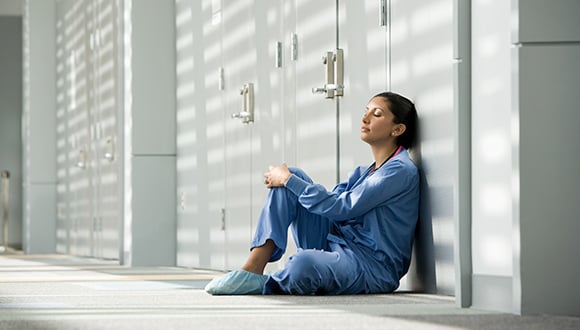7 effects of sleep deprivation – and how to fix it
Published June 2023 | 6 min read
Expert contributors Dr Moira Junge, CEO of the Sleep Health Foundation; Dr Prerna Varma, research fellow in sleep and circadian medicine at Monash University
Words by Gina Flaxman
Not getting enough shut-eye can be harmful to your health. Here’s how to improve your sleep.
We all have the occasional bad night’s sleep which can leave you feeling tired and foggy the next day, irritable and easily frustrated, or even nodding off at work. If you go to bed early that night, chances are you’ll wake up feeling a lot better. But not getting enough sleep for several nights and regular sleep deprivation can have serious consequences for your health.
"Sleep is a core pillar of our wellbeing," says Dr Moira Junge, CEO of the Sleep Health Foundation. "It affects every aspect of our physical and mental health."
The statistics are alarming – 39.8% of Aussie adults have inadequate sleep, and a Sleep Health Foundation study found one in 10 have a diagnosed sleep disorder like insomnia, restless leg syndrome or obstructive sleep apnoea. Dr Junge says while her organisation estimates 50 to 60% of Aussies have at least one symptom of a diagnosed sleep disorder, many people just don’t prioritise their sleep.
Sometimes sleep deprivation is due to lifestyle factors that are out of your control, like dealing with a stressful situation at work, a divorce or a death in the family. You might be undergoing chemotherapy, or be a shift worker or new parent. In fact, early parenthood is synonymous with sleep deprivation, with one study suggesting that new parents face up to six years of broken sleep, with rest at its worst three months after their child’s birth.
What is sleep deprivation?
"Sleep deprivation is specific to the individual. It’s a failure to get adequate sleep for your own needs," says Dr Junge. She adds that the quality and depth of your sleep is just as important as the quantity, and the term ‘adequate sleep’ encompasses both.
So how much sleep is enough and how can you tell if you have sleep deprivation? Dr Junge says this is subjective. The Sleep Health Foundation recommends seven to nine hours a night but she says anywhere between six and 10 hours a night is considered normal, depending on the individual.
Here are some of the effects of inadequate sleep – and what you can do about it.

1. Drowsiness and fatigue
"One of the first signs of sleep deprivation is functioning the next day – you may feel fatigued and more tired than usual," says Dr Prerna Varma, research fellow in sleep and circadian medicine at Monash University. "One major health and safety risk [of this] is microsleep – those few seconds your body just shuts down because it is so sleep deprived, like when you’re driving a car or operating heavy machinery."
The Australian Automobile Association says 20 to 30% of all car crashes in Australia can be attributed to fatigue.
2. Moodiness
A lack of sleep often leaves you feeling grumpy, irritable or over-emotional. Regular sleep loss can increase negative moods as you’re less able to regulate them, leaving you more prone to depression if you’re sleep deprived on a regular basis.
Inadequate sleep can also skew the normal social cues you get from other people and make you more inclined to see others as unfriendly. “After just one night of sleep deprivation, there’s a decline in the ability to accurately perceive facial expressions,” says Dr Varma. “So you may perceive others’ faces as threatening.” This is because sleep deprivation affects the central and peripheral nervous systems, which means we can lose our ability to connect with others.
3. Poor memory and information retention
Sleep deprivation affects your memory and ability to retain new information because the activity in the hippocampus, the brain’s memory centre, is reduced.
One study found even one night of partial sleep deprivation affects executive functioning (the processes which help us plan, focus and remember instructions) so your ability to concentrate and solve problems is impacted. “Sleep deprivation makes you less able to work efficiently and tolerate the pressures of life,” says Dr Junge.
4. Weight gain
A 2022 study review found restricting sleep for up to five days can lead to short-term weight gain and that “short sleep duration is associated with obesity and the risk of future weight gain in both adults and children”.
“You’re more likely to put on weight partly because you’re craving sugar and fat to keep you alert and also because there’s a disturbance to ghrelin and leptin, the hormones that control appetite,” says Dr Junge. “So being sleep deprived actually makes you eat more.”
5. Heart problems
Sleep affects the processes that keep your heart and blood vessels healthy. A new study by researchers from the University of Sydney and the University of Southern Denmark found poor sleep could lead to between two and seven years of heightened heart disease risk. Because a lack of sleep affects your blood vessels, your risk of a stroke is also increased.
6. Low libido
Inadequate sleep can affect your sexual functioning. “If you have less than five hours’ sleep, you have the testosterone of a much older person,” says Dr Junge. A US study found skipping sleep reduced a young man’s testosterone levels by the same amount as ageing 10 to 15 years. This is because a lack of sleep disrupts the endocrine system, which regulates your hormones. It has also been associated with reduced sexual desire and arousal in women.
7. Increased risk of illness and disease
While you sleep, your immune system produces antibodies and cytokines to fight infection. If you don’t get enough shut-eye, in the short term your immune system is less able to protect you from illnesses like colds and flu.
Longer term sleep deprivation is associated with insulin resistance, which could lead to type 2 diabetes. Research also suggests it could increase your risk of dementia.

How you can fix sleep deprivation
The good news is there’s a lot you can do to get back into healthier sleeping patterns. If you’re not sure where to start or why you aren’t sleeping well, here’s how to start tackling the issue.
- See your GP. The first step is to have a chat with your GP to rule out any underlying causes. "You can’t really fix your sleep until you know what the cause [of your sleep deprivation] is," says Dr Junge. "And it’s different things for different people." She says sleep deprivation could be due to any number of medical issues, from low iron levels to depression.
- Protect your sleep. Once you’ve ruled out any medical reasons or conditions, the next step is to set yourself up for a good night’s sleep. Make sure you’re exercising regularly, tackling your stress and eating healthily, getting lots of light during the day and not using alcohol or drugs to help you sleep.
- Get into bed earlier. Dr Junge says it’s important to make sure you leave enough time for your sleep. "If you know you need eight hours’ sleep, you probably have to carve out about nine or 10 hours because you [also] need time to unwind."
- Embrace afternoon naps. If your poor sleep is due to lifestyle factors that are temporarily out of your control like a stressful period or caring for a newborn, Dr Junge says you should try to nap when you can, practise self-compassion and seek out help and support from family, friends and your GP.
- Prioritise getting enough sleep between shifts if you’re a shift worker. "Fostering good sleep practices, like keeping your room dark and cool, avoiding light during daytime sleep, avoiding alcohol before sleep and reducing noise, will help," says Dr Varma.
Professional help and sleep deprivation
"Most people don’t have a sleep condition that needs a doctor," says Dr Junge. "Mostly, it’s [about] learning to turn Netflix off a bit earlier, learning to carve out more time [to wind down]. Sleep competes with our jobs, our deadlines, our fitness, the demands of our family life and our pets. It’s up to us to put it front and centre."
Help is here for a better night's sleep
Thanks to our partnership with Sleepfit Solutions, eligible members* can get a free 12-month subscription to the Sleepfit app, which has been designed to help improve your sleep and overall wellbeing.
If you can't see your GP face-to-face, our partnership with GP2U, an online video GP service, makes it easier for eligible members to access telehealth services. All HCF members with health cover can access a standard GP consultation (up to 10 minutes) for a fee of $50. See hcf.com.au/gp2u for more information.
Related articles
HOW TO IMPROVE YOUR SLEEP
Simple sleep strategies to help you get more restorative shut-eye – all night long.
WHY ALCOHOL AND SLEEP DON’T MIX
Relying on alcohol impacts the quality of your sleep, and can lead to other health risks. Here’s how to break the cycle.
HOW TO MANAGE STRESS
Reclaim calm with these expert-approved approaches to dealing with stress and anxiety.
IMPORTANT INFORMATION
* Eligibility criteria apply. See hcf.com.au/sleepfit for details.
This communication contains information which is copyright to The Hospitals Contribution Fund of Australia Limited (HCF). It should not be copied, disclosed or distributed without the authority of HCF. Except as required by law, HCF does not represent, warrant and/or guarantee that this communication is free from errors, virus, interception or interference. All reasonable efforts have been taken to ensure the accuracy of material contained on this website. It’s not intended that this website be comprehensive or render advice. HCF members should rely on authoritative advice they seek from qualified practitioners in the health and medical fields as the information provided on this website is general information only and may not be suitable to individual circumstances or health needs. Please check with your health professional before making any dietary, medical or other health decisions as a result of reading this website.